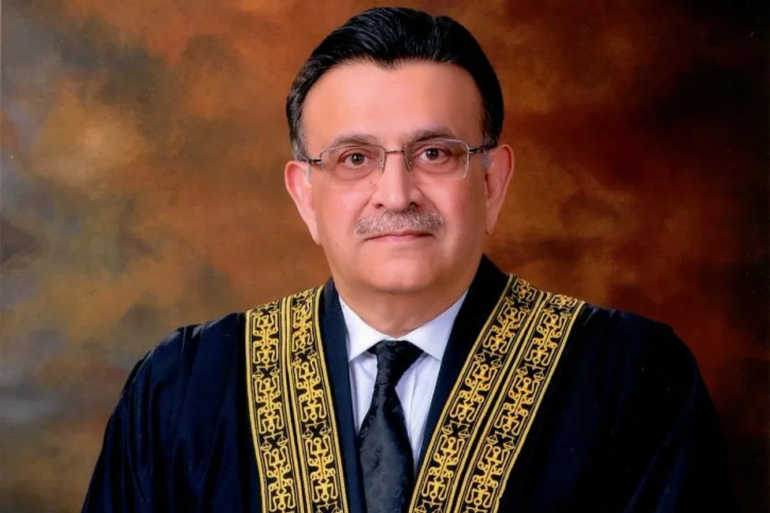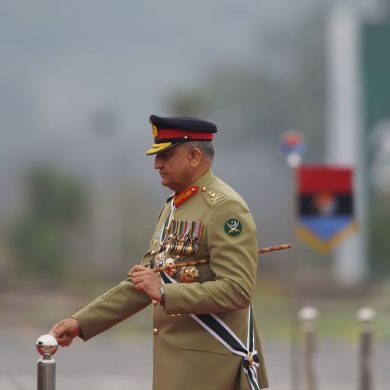Chief Justice Umar Ata Bandial on Tuesday directed officials concerned to track down well-known social media account “Indibell” allegedly operating by a hacker.
He gave directives while hearing four separate petitions challenging the constitution of a high-powered judicial commission tasked with investigating the audio leaks involving members of the judiciary.
The case was heading by the apex court bench which was comprised of Justice Ijaz ul Ahsan, Justice Munib Akhtar, Justice Syed Hasan Azhar Rizvi, and Justice Shahid Waheed.
The hacker allegedly leaked audio recordings of purported telephonic conversations involving senior jurists, which raised question on credibility of the judiciary.
Prior to the hearing, Abid Shahid Zuberi, the President of the Supreme Court Bar Association (SCBA), submitted several orders from different high courts to be considered for the case’s adjudication. These orders included rulings from the apex court, the Islamabad High Court, and the Lahore High Court.
During the hearing, Attorney General for Pakistan (AGP) Mansoor Usman Awan raised concerns regarding the alleged “conflict of interest” of judges presiding over the petitions filed against the high-powered judicial commission investigating leaked audio recordings.
However, Chief Justice Umar Ata Bandial firmly asserted the constitutional powers of the apex court, stating that the powers of the chief justice or any judge cannot be diminished based on allegations.
Responding to objections raised by the government against the bench hearing the appeals, Chief Justice Bandial questioned how there could be a discussion assuming personal benefits for judges, including the chief justice, without any evidence.
He cautioned the executive against interfering with the powers of the court and highlighted that the court was not consulted before the commission’s formation.
The Chief Justice urged the AGP to present evidence to substantiate the allegations rather than raising objections against judges based on mere allegations.
Justice Akhtar, another member of the bench, raised concerns about the government’s decision to publicize the leaked audio recordings. He questioned whether the government was asserting the authenticity of the audios and inquired about the involvement of the hacker and the minister’s decision to make the audios public through a press conference.
Justice Akhtar further questioned whether a government official could accuse a judge before confirming the facts and emphasized the need for a thorough investigation before making such accusations.
The AGP defended the government by stating that ministers’ statements should not be attributed to the government itself.
In response, Justice Akhtar questioned the alignment between the government’s policy and the ministers’ statements, suggesting that a minister’s words would be seen as representative of the cabinet’s views.
He also raised concerns about the impact of the ministerial press conferences and requested an update on the status of the application filed in this regard.
Chief Justice Bandial inquired whether the government had utilized its resources to investigate the origin and methods used for recording the audios.
The AGP informed the court that a commission had been established to conduct a comprehensive investigation, including identifying the source and process of the audio recordings.
Chief Justice Bandial expressed concerns about the Twitter account associated with the hacker, Indibell, and warned of the potential for false news against judges being spread through such platforms.
During the hearing, counsel Shoaib Shaheen, representing Abid Shahid Zuberi, pointed out that the government had not included an investigation into the source of the audio leaks in the commission’s Terms of Reference (TORs).
Shaheen further alleged that the leaked audios were assumed to be true, leading to doubts regarding the independence of the judiciary.
He criticized the Pakistan Electronic Media Regulatory Authority (Pemra) for not monitoring the broadcast of the leaked audios despite a ban imposed by Justice Mohsin Akhtar Kayani of the Islamabad High Court. Shaheen argued that these actions were aimed at discrediting the judiciary.
As the SCBA lawyer concluded his arguments, AGP Awan came to the rostrum and said that the government’s plea regarding the reconstitution of the bench was not related to bias but the conflict of interest. He requested the court to overlook Shaheen’s arguments in this regard.
“We will think about it,” the CJP replied. He appreciated the arguments presented by Awan and Shaheen, saying that the court’s order restraining the audio leaks panel from going ahead with its task was still in place.
Subsequently, the hearing was adjourned indefinitely with Justice Bandial saying that the court would ponder upon its decision regarding the government’s plea.



